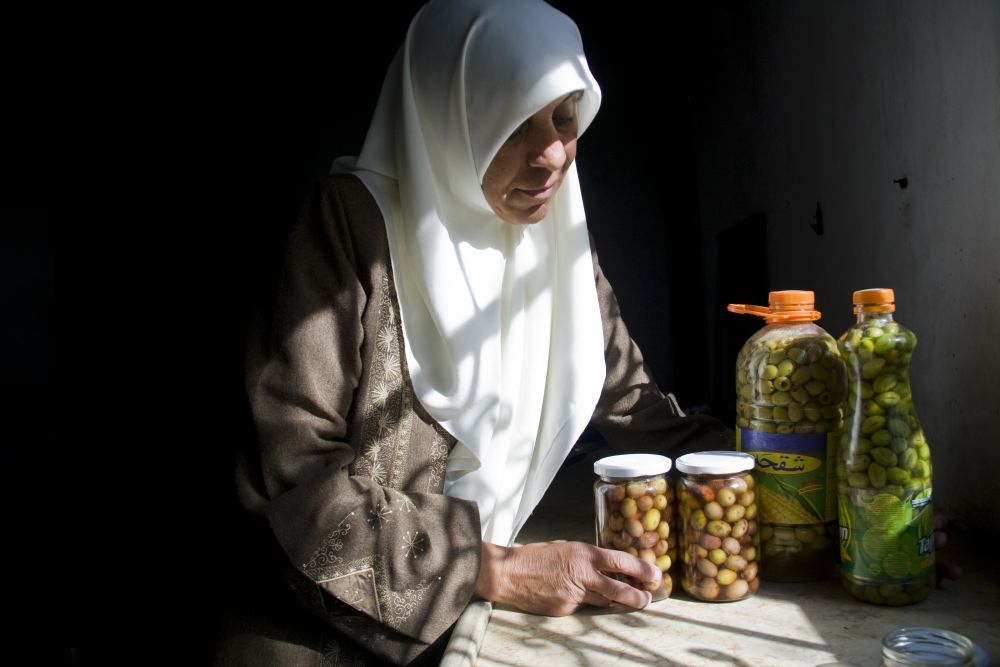
The women of the Holy Land and the treasures kept for generations
Knowledge, flavors and … soaps! with these three words we could symbolically summarize the many projects of ATS pro Terra Sancta that strictly involve the Palestinian women; know how all the actions of the association are developed starting from a deep research and attention of the Palestinian traditions: research and sharing of knowledge, to develop new ones, creating opportunities and development. The attention and conservation of the local artistic, cultural and social heritage are the main engine of many activities that the NGO has been carrying out for many years. The collaboration with the Mosaic Center Jericho was born with this aim: to create new job opportunities safeguard an art that has ancient roots in these lands: the mosaic. Palestinian men and women, without distinction of gender, religion or belonging, have all learned together the techniques of restoration of ancient mosaics and to create new ones. An art that requires skill, patience and precision.
The same care and attention that is also required for women working in the Nisf Jubeil ceramic workshop. In this village near Sebastia, Samaria, four ladies without specific artistic studies, but a great passion for art, have started a workshop for the production of ceramic products. Every day they create and decorate dishes, bowls, and other artefacts inspired by tradition (many drawings and figures are inspired by the archaeological findings found in the site of Sebastia), but also leaving room for their imagination; even though they are all Muslim women, they recreated nativity scenes and Christmas decorations to be sold in the many local markets, demonstrating how, through beauty, many differences can be overcome. For many of them it is a great opportunity, a moment of redemption from the many difficulties of life. So it was for Ruwaida: after a stormy divorce with her husband, she returned from Jordan without being able to bring all her children with her, but only the youngest Lujain, finding a purpose and independence through painting gave her a new power.
The combination of skills between women is a strong response to gender discrimination and the obstacles that Palestinian women face in a very complex political and social situation. In Bethlehem, the mothers of the Saint Josef School attend a weekly program, strongly desired by the social workers, Naila and Gloria Nasser, in which every Wednesday morning they attend classes of different themes psychology, sociology, children’s education, economy and much more. An all-female course where mothers and women can compare each other, learning new subjects useful for themselves and their family life.
Even Shorouq Society for Women, a women association of Bethany, has put together the knowledge of about twenty women to start a business. They sew and embroider traditional clothes, run a canteen of fresh food for school children and have a production of soaps. And here are the flavors and soaps: the Palestinian cuisine and the uses of olive oil are the true treasure of this people, a precious treasure placed in the hands of women who pass it down from generation to generation. An inheritance that is spoken of since the Gospels (Martha and Mary, sisters of Lazarus, to cook dinner to Jesus and Mary, with a premonitory gesture, to anoint the hair of Christ with the oil of Nardo) and that even today it makes Bethany and its women proud of their tradition.
The soaps produced by the women of Sebastia and Bethany with natural ingredients and perfumes, the lunches served in the Mosaic Guest-house, rigorously cooked with local products, the jams and the dried fruit of Rami’s mother, now become a quality mark, are the way in which ATS pro Terra Sancta wants to make known to the many tourists and pilgrims the culture and the beauty of these places, creating a sustainable and ethical economic development for the local population and for the women in particular.